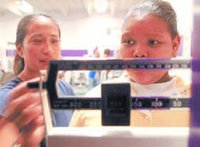One the media ignored: Please don’t weigh the children
 The panic surrounding childhood obesity has led public schools administrators, politicians and consumer groups to get behind “prevention” approaches which encourage weighing and screening children for “obesity.”
The panic surrounding childhood obesity has led public schools administrators, politicians and consumer groups to get behind “prevention” approaches which encourage weighing and screening children for “obesity.” Without regard to the evidence.
Project EAT, a study of 2516 Minnesota adolescents, led by Dianne Neumark-Sztainer, PhD, MPH, RD at the University of Minnesota just released more findings suggesting harm from current “obesity prevention” strategies. They found that programs focusing on children’s weights encouraged self-monitoring, especially among the girls.
But weighing themselves had no effect on their BMIs (body mass index) for the older teens (15-20 years old) over the five year period. However, among younger teen girls (13-17 years old) weighing themselves often, their BMIs increased nearly two times over their classmates not weighing themselves during those years. Among all of the teen girls, weighing themselves also predicted unhealthy weight control behaviors and disordered eating within just a few years. Girls are more concerned with weight loss than the boys, and for them, weighing may be harmful, according to the researchers. The combination of being a restrained eater and receiving negative feedback when they step on the scale has been shown in studies to have a strong negative impact on their well being.
The authors note that unlike some studies reporting on successful “weight maintainers” and claiming that weight monitoring helps, this study group was more representative of the general population. Their findings also suggest that approaches for adults are not appropriate for young people because of their developmental differences. Based on the findings throughout this Project, the researchers advise that public health interventions should avoid messages focused on weight. Sadly, this is not the first such study to suggest harm. It concurs with the body of evidence showing the unsupportable nature of all "childhood obesity" initiatives. The U.S. Preventive Services Task Force, under the Health and Human Services Department, conducted a comprehensive review of all of the evidence on screening and preventive interventions for “overweight” children and adolescents last year. They found the evidence did not support routine screening, behavioral counseling or preventive interventions. Such measures had not been shown to improve health measures or health outcomes for children and adolescents. Their recommendations did caution that the potential harm of screening and weighing young people included: “labeling, induced self-managed dieting with its negative sequelae, poorer self-concept, poorer health habits, disordered eating or negative impacts from parental concerns.” Musings:Beliefs, not evidence, continue to come first. Don't our children deserve better?




<< Home